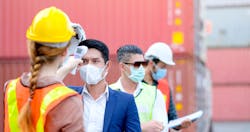California Says Workers Comp Applies to Coronavirus
Any COVID-19 diagnosis qualifies an employee for workers’ compensation benefits, according to a recent executive order issued by California Gov. Gavin Newsom. Other states have taken similar but more limited steps.
Business owners and employers across the country have been struggling with the prospect of increased liability arising from the Coronavirus pandemic, especially now that businesses are reopening across the country after two to three months of lockdown orders at the state level.
“In light of this newly-established presumption that an employee who contracts COVID-19 is presumed to have done so at work, employers should be prepared for the likelihood of increased workers’ comp claims, and a corresponding rise in workers’ comp premiums, when formulating its reopening plans,” say attorneys Tao Leung and Elizabeth Goncharov of the law firm of Hogan Lovells.
Even if challenged in court, employers need to act in accordance with Newsom’s view or they may have to face the consequences, according to Leonora M. Schloss and David S. Allen, attorneys with the law firm of Jackson Lewis. “The governor has taken the extraordinary step of presuming a workplace injury without specific evidence of job-causation,” they stress.
“While the scope and legality of the new executive order may be subject to challenge, it is incumbent upon the California employer to review and enforce workplace safety, in all areas, and to specifically protect against the risk of employee exposure to a communicable disease, thereby avoiding added liability and costs associated with job illness or injury claims.”
In California, any employee experiencing any COVID-19-related illness is presumed to qualify for workers’ comp benefits if:
● The employee tested positive for or was diagnosed with COVID-19 within 14 days after working at the employer’s direction.
● The work was performed on or after March 19, 2020, and before July 6, 2020.
● The place of employment was not the employee’s home.
● The diagnosis was performed by a licensed California physician and the diagnosis is confirmed by further testing within 30 days of the date of the diagnosis.
Challenging the Presumption
Employees are eligible for all workers’ comp benefits, including full hospital, surgical, medical treatment, disability indemnity and death benefits. There is no waiting period for temporary disability benefits, but an employee who has paid sick leave benefits specifically available in response to COVID-19 must exhaust those before any temporary disability benefits are due and payable.
If the employee is diagnosed with COVID-19 on or after May 6, 2020, they must be certified for temporary disability within the first 15 days after the initial diagnosis and recertified for temporary disability every 15 days thereafter for the first 45 days following diagnosis.
If the employee was diagnosed before May 6, the employee must obtain a certification within 15 days of the date of the order (by May 21, 2020), documenting the period for which the employee was temporarily disabled and unable to work, and must be recertified for temporary disability every 15 days thereafter, for the first 45 days following diagnosis.
It is possible for employers to dispute the presumption, according to attorneys Marie Burke Kenny and Clint S. Engleson of the Procopio Cory Hargreaves & Savitch law firm. The presumption is disputable if controverted by other evidence within 30 days of a claim. After this 30-day period, a claim of a COVID-19-related illness is only disputable based on new evidence acquired after the 30-day period.
The downside is that the order does not provide guidance as to what “other evidence” could be helpful to employers, Kenny and Engleson point out.
“Presumably, employers could present evidence that the employee was directly exposed COVID-19 at home, adherence to enhanced sanitation and safety protocols, contract tracing and a lack of other COVID-19-related illnesses in the workplace,” they say. “However, given the highly-communicable nature of COVID-19 and the current challenges with consistent contact tracing and testing, employers will likely face an uphill battle.”
Another complication arises if the employee reported a COVID-19 diagnosis to an employer before May 6. Generally, an employer must provide an employee with a workers’ comp claim form within one working day after the employee reports a work-related illness. That now includes reports of a work-related COVID-19 diagnosis, note Kenny and Engleson.
However, if an employee reported a COVID-19- diagnosis before May 6, an employer’s obligations are less clear. The order allows employees diagnosed prior to May 6 until May 21 to obtain documentation of a COVID-19-related disability, suggesting that an employer may be obligated to provide employees with a claim form under such circumstances.
The governor directed the administrative director of the California Division of Workers’ Compensation to adopt, amend, or repeal any regulations necessary to implement the order. As a result, employers should monitor the division’s COVID-19 resources website for updates, Kenny and Engleson stress.
Other States Act
A handful of other states have already made it easier for certain employees who have contracted COVID-19 to obtain workers’ comp benefits by creating a legal presumption that the employees contracted the disease as a result of their employment.
“Considering the potential for a wave of claims from employees contracting the virus, it is critical for employers to stay up to date on these developments in the coming months as they reopen or continue to operate,” say attorneys Melissa Hill, Michael D'Agostino and Kaiser Chowdhry of the law firm of Morgan Lewis & Bockius.
While the California order is the most expansive of its type so far, other states have imposed similar presumptions, but only for specific types of workers. Alaska, Florida, Michigan, Minnesota, Missouri, New Hampshire, Utah, Washington State and Wisconsin have all enacted, announced or released rules creating such presumptions for first responders or essential workers (such as firefighters, law enforcement and certain medical providers) who become infected with COVID-19 contracted it at work.
Legislation is pending in other states to impose similar presumptions and several governors have signed executive orders to the same effect. “Many of these executive orders and much of the pending legislation (as currently drafted) seek to create a presumption for specific and narrow categories of employees that are considered more likely to come into contact with the coronavirus in the course of their employment,” the attorneys say.
Some pending state actions, such as one bill currently before the Ohio state legislature, are similar to California’s executive order in that they cover any employee required to work outside of his or her home during the state’s stay-at-home order.
For employees not covered by a presumption, they will still be required to demonstrate causation, that is, that they contracted COVID-19 in the workplace. But existing case law or statutes in various jurisdictions may make easier an employee’s attempt to obtain workers’ comp benefits for COVID-19 related injuries and expenses, Hill, D'Agostino and Chowdhry observe.
In Connecticut, for example, direct exposure to an infectious disease (as opposed to, say, a physical wound or trauma) can be a compensable injury under the state’s Workers’ Compensation Act. Under the District of Columbia Workers’ Compensation Act, an employee has a rebuttable presumption that the claim is compensable if something unexpectedly went wrong with his or her body and the working conditions could have caused the harm.
“Other states have legislation pending to implement such a presumption. Employers—particularly those operating in multiple states—should stay abreast of this rapidly changing workers’ compensation landscape,” the attorneys urge.
Morgan Lewis offers a workers’ comp 50-state survey that tracks how existing state law and workers’ comp schemes address or may apply to COVID-19 claims, along with the relevant legislative proposals and executive orders. To subscribe, contact the law firm.
About the Author

David Sparkman
David Sparkman is founding editor of ACWI Advance, the newsletter of the American Chain of Warehouses Inc. He also heads David Sparkman Consulting, a Washington, D.C. area public relations and communications firm. Prior to these he was director of industry relations for the International Warehouse Logistics Association. Sparkman has also been a freelance writer, specializing in logistics and freight transportation. He has served as vice president of communications for the American Moving and Storage Association, director of communications for the National Private Truck Council, and for two decades with American Trucking Associations on its weekly newspaper, Transport Topics.
